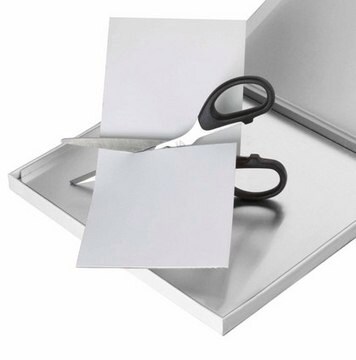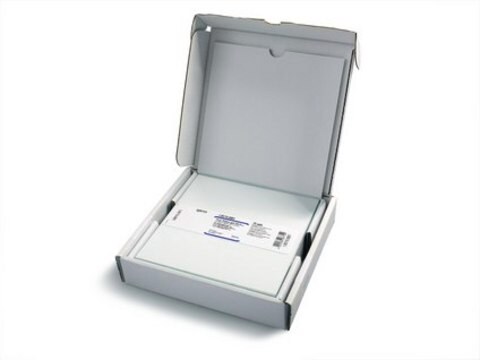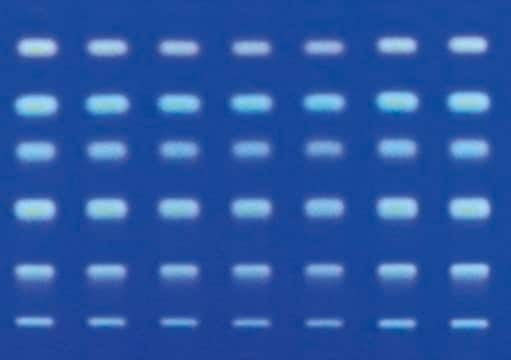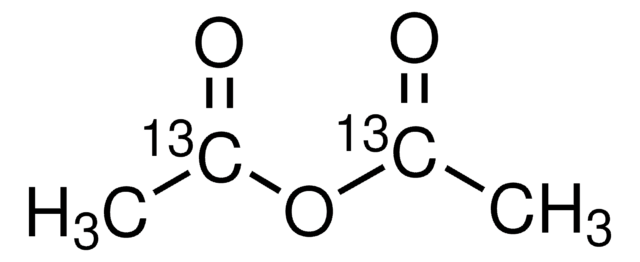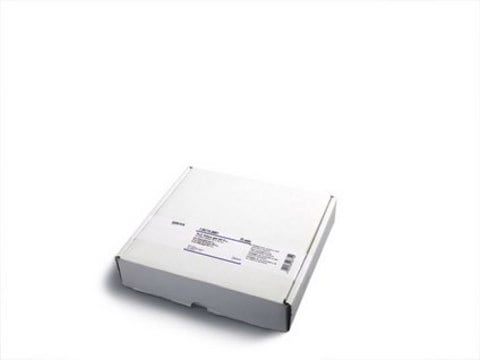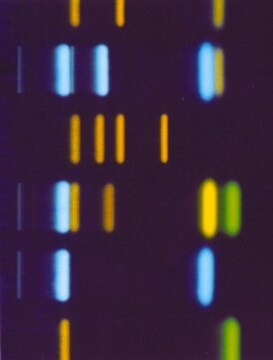1.05570
TLC Silica gel 60 F₂₅₄
pkg of 25 sheets, sheet L × W 20 cm × 10 cm, aluminum support
Zaloguj sięWyświetlanie cen organizacyjnych i kontraktowych
About This Item
Kod UNSPSC:
41115711
NACRES:
NB.21
Polecane produkty
Materiały
aluminum support
silica gel 60 matrix
Poziom jakości
Właściwości
binder Organic Polymer
fluorescent indicator
opakowanie
pkg of 25 sheets
metody
thin layer chromatography (TLC): suitable
grubość warstwy
200 μm
arkusz dł. × szer.
20 cm × 10 cm
wielkość cząstki
10-12 μm
wielkość porów
60 Å medium pore diameter
temp. przechowywania
2-30°C
Opis ogólny
25 Aluminium sheets 10 x 20 cm
Our classical silica TLC plates are based on a combination of our proven silica gel 60 and the addition of a unique polymeric binder resulting in a very adherent and hard surface that will not crack or blister and even allow writing with a pensil on the surface without risk to damage the layer.
Zastosowanie
- Nonstoichiometric Protic Ionic Liquids: The Role of Excess Acid in Charge Transport Mechanisms: This research examines the influence of trifluoromethanesulfonic acid in creating nonstoichiometric protic ionic liquids, providing a foundation for enhancing ionic conductivity and battery technologies (Middendorf and Schönhoff, 2024).
- B(9)-OH-o-Carboranes: Synthesis, Mechanism, and Property Exploration: The study explores the utilization of trifluoromethanesulfonic acid in the synthesis of boron-rich clusters, highlighting its role in the development of new materials with unique chemical properties (Ma et al., 2023).
- High pressure as a novel tool for the cationic ROP of γ-butyrolactone: Demonstrates trifluoromethanesulfonic acid′s application in polymer chemistry, specifically in ring-opening polymerization under high-pressure conditions, opening avenues for materials science research (Bernat et al., 2021).
- Peptide Cyclization Mediated by Metal-Free S-Arylation: This research utilizes trifluoromethanesulfonic acid to facilitate peptide cyclization, a crucial reaction in the development of therapeutic peptides and pharmaceutical applications (Kobayashi et al., 2021).
Komentarz do analizy
Specific surface area (according to BET; 5-Pt. measurement): 480 - 540 m²/g
Pore volume (N₂-isotherm): 0.74 - 0.84 ml/g
d 50 (laser diffraction, size distribution): 9.5 - 11.5 µm
Layer thickness: 165 - 235 µm
Deviation of layer thickness per plate: ≤ 35 µm
Chromatographic testing:
colour test
hRf-values
- bleu vif organol, colour test, lipophile:
11 - 25
- Ceres Black G, colour test, lipophile: 34 - 48
- ceres Violet brn, colour test, lipophile: 52 - 67
Typical value determined on a conditioned sheet
Eluent: toluene (45% rel. humidity)
Pore volume (N₂-isotherm): 0.74 - 0.84 ml/g
d 50 (laser diffraction, size distribution): 9.5 - 11.5 µm
Layer thickness: 165 - 235 µm
Deviation of layer thickness per plate: ≤ 35 µm
Chromatographic testing:
colour test
hRf-values
- bleu vif organol, colour test, lipophile:
11 - 25
- Ceres Black G, colour test, lipophile: 34 - 48
- ceres Violet brn, colour test, lipophile: 52 - 67
Typical value determined on a conditioned sheet
Eluent: toluene (45% rel. humidity)
This page may contain text that has been machine translated.
Certyfikaty analizy (CoA)
Poszukaj Certyfikaty analizy (CoA), wpisując numer partii/serii produktów. Numery serii i partii można znaleźć na etykiecie produktu po słowach „seria” lub „partia”.
Masz już ten produkt?
Dokumenty związane z niedawno zakupionymi produktami zostały zamieszczone w Bibliotece dokumentów.
Klienci oglądali również te produkty
Nasz zespół naukowców ma doświadczenie we wszystkich obszarach badań, w tym w naukach przyrodniczych, materiałoznawstwie, syntezie chemicznej, chromatografii, analityce i wielu innych dziedzinach.
Skontaktuj się z zespołem ds. pomocy technicznej
